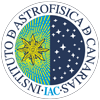Tsevi Mazeh
 Stay at the IAC: 19/10/2014 to 18/12/2014
Stay at the IAC: 19/10/2014 to 18/12/2014 ![]()
Research line: Planetary Systems
Prof. Tsevi Mazeh gave a Severo Ochoa-Jesús Serra Foundation seminar at the IAC on December 2nd 2014, entitled The exo-planet obliquity as a fingerprint of planetary formation and evolution - Surprising clue from stellar rotational photometric modulations of Kepler transiting planets.
Tsevi Mazeh is Professor of Physics & Astronomy at Tel Aviv University (Israel), where he has served as researcher and lecturer since 1979.
Mazeh has studied at the Hebrew University in Jerusalem, where he earned his bachelor’s, master’s, and doctoral degrees. He was a postdoctoral fellow in the University of California at Berkeley’s astronomy department and a visiting scientist at the Smithsonian National Air and Space Museum, the Harvard-Smithsonian Center for Astrophysics, the Observatory of Geneva, and the University of Amsterdam.
Throughout his career Prof. Mazeh has been both a theorist and an observer. In 1984 Mazeh initiated the first ever "radial-velocity" search for extra-solar planets in pursuit of his paradigm-shaking hypothesis that massive planets could exist close to their parent stars, at that time widely believed to be impossible. Mazeh's observations, carried out with Dave Latham (Harvard) and in cooperation with Michel Mayor (Geneva) provided the breakthrough discovery in 1989 of the first known massive candidate for extra-solar planet HD114762b. In 2000, Mazeh led the research and discovery of the planet around the star HD209458, enabling its subsequent detection as the first known transiting (eclipsing) planet.
Prof. Mazeh is an internationally recognized expert in the analysis and interpretation of photometric temporal sequences of extrasolar planets and binary stars. The most outstanding works of he and his group have been developing several algorithms for the detection of transits (f.i., BLS); the suppression of systematic errors in light curves and radial velocities; and several works related to eclipsing binaries, most notably: the detection of relativistic effects in their light curves ('beaming effects').
Prof. Mazeh maintains a regular collaboration with the Planetary Systems group at the IAC, led by Hans Deeg, both in meetings of the CoRoT space mission, as well as in more than 20 scientific publications together. The specific objectives of his stay at the IAC are framed in the following projects:
- Search for circumbinary planets, both in the CoRoT full sample and in the definition of the future mission PLATO. Mazeh's extensive experience in developing detection algorithms and in binary stars can produce significant progress on this project.
- Discovery of massive exoplanet candidates from relativistic effects. These objects have been identified by Mazeh in the sample of the Kepler mission, with its 'BEER' algorithm.
Given the wide range of interests of Tsevi Mazeh, it is expected that his visit has positive implications for most exoplanets-group members at the IAC. He will be invited to participate regularly in the weekly 'Exocafé', in which new results and projects are discussed.


